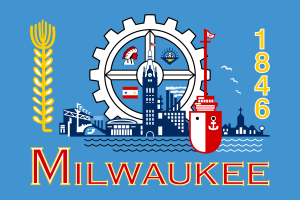Here you’ll find the largest list with Milwaukee web hosting reviews. We’ve listed all Milwaukee hosting providers with our UNCENSORED review.

Quick Facts
Internet Speed: 19.5 Mbps downlink; 3.8 Mbps uplink
Population: 600,000.
Internet Coverage: more than 95% of residents
Main Internet Services: Cable, DSL, Fiber
Main Internet Service Providers: Time Warner Spectrum, AT&T (DSL), AT&T (Fiber)
Colocation Datacenters: 15 (prominent companies: Cogent Communications, ISCorp, Data Holdings, LLC.)
Internet in Milwaukee
According to Akamai.com, the average downlink Internet speed in Milwaukee is 19.5 Mbps and the average uplink speed is 3.8 Mbps.
In 2016, the population of Milwaukee was 600,000. More than 95% of residents have access to the Internet, especially broadband connections.
Main Internet services provided in Milwaukee are as follows:
– Cable – 95% coverage
– DSL – 93.7% coverage
– Fiber – less than 10% coverage
Main Internet Service Providers located in Milwaukee are the following:
– Time Warner Spectrum (Cable) – 95% availability
– AT&T (DSL) – 92% availability
– AT&T (Fiber) – less than 10% availability
Gigabit Internet in Milwaukee
AT&T is currently the only local company which provides gigabit Internet to Milwaukee residents, delivered through existing copper lines, using the latest DOCSIS 3.1 technology. This service had already been provided locally before AT&T announced that they would back in 2016, but only to large businesses located in certain business parks. Nowadays, this service is available to residential customers as well. Time Warner Cable have also shown interest in rolling out gigabit services to Milwaukee residents, but no concrete plans have been released in this matter.
Colocation Datacenters in Milwaukee
According to datacentermap.com, there are currently 15 colocation datacenters located in Milwaukee. Major colocation companies include the following:
– Cogent Communications, Inc.
– ISCorp
– Data Holdings, LLC.
– Transcedent
– Ethoplex
Prominet Colocation Providers
One of the biggest colocation providers located in Milwaukee is ISCorp, whose main datacenter is located 15 minutes away from metro Milwaukee. The datacenter features diverse diesel generators, N+1 CRAC units, private dark fiber ring through metro Milwaukee, as well as carrier neutrality, with on-premise access to over 5 local ISPs, as well as connectivity to other colocation providers.
Another important colocation provider located in Milwaukee is Cogent Communications, which operate dozens of million-dollar facilities nationwide. Their Milwaukee-based facility offers 608 square feet of raised floor for colocation space, as well as carrier neutrality, with on-premise access to over 5 ISPs, including AT&T, Patec, and Time Warner Spectrum.
Current Trends
Milwaukee is regarded as a secondary datacenter market in terms of national importance, but current trends indicate that this might change soon enough, as heavy investments are poured into the market by large colocation providers.
Investments & Acquisitions
In November 2014, Cosentry, one of the biggest players in the U.S. colocation market, acquired Milwaukee-based Red Anvil Datacenters, thus expanding its operations into the local datacenter market. According to an official statement, the acquisition was made in order to interconnect Red Anvil’s facilities with the company’s other locations in order to provide high-speed, redundant backup and disaster recovery services to local customers, as well as customers coming from other markets.
Demand
The local economy is based on diverse private sectors, including brewing, manufacturing, healthcare, as well as tech industries. Demand for colocation is mostly driven by these industries. However, Milwaukee has recently been flooded with demand coming from other states, such as Chicago, where the colo markets are currently experiencing all-time low vacancy rates.
Advantages
Another significant advantage is that Milwaukee is located in close proximity to other big or emerging markets, such as Minnesota, Michigan, Illinois, and Indiana. As prices for colocation space increase in all the aforementioned states, they go down in Wisconsin, which is bound to attract more customers than in the past, which will culminate with the transition from an undeserved market to an emerging market.

